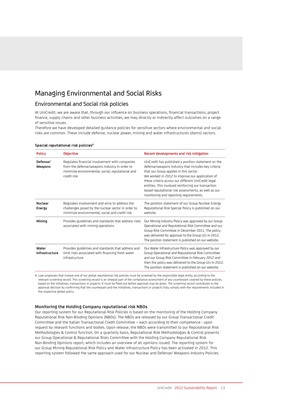
Managing Environmental and Social Risks
Environmental and Social risk policies
At UniCredit, we are aware that, through our influence on business operations, financial transactions, project
finance, supply chains and other business activities, we may directly or indirectly affect outcomes on a range
of sensitive issues.
Therefore we have developed detailed guidance policies for sensitive sectors where environmental and social
risks are common. These include defense, nuclear power, mining and water infrastructures (dams) sectors.
Special reputational risk policiesA
Policy Objective Recent developments and risk mitigation
Defense/ Regulates financial involvement with companies UniCredit has published a position statement on the
Weapons from the defense/weapons industry in order to defense/weapons industry that includes key criteria
minimize environmental, social, reputational and that our Group applies in this sector.
credit risk We worked in 2012 to improve our application of
these criteria across our different UniCredit legal
entities. This involved reinforcing our transaction
based reputational risk assessments, as well as our
monitoring and reporting requirements.
Nuclear Regulates involvement and aims to address the The position statement of our Group Nuclear Energy
Energy challenges posed by the nuclear sector in order to Reputational Risk Special Policy is published on our
minimize environmental, social and credit risk website.
Mining Provides guidelines and standards that address risks Our Mining Industry Policy was approved by our Group
associated with mining operations Operational and Reputational Risk Committee and our
Group Risk Committee in December 2011. The policy
was delivered for approval to the Group LEs in 2012.
The position statement is published on our website.
Water Provides guidelines and standards that address and Our Water Infrastructure Policy was approved by our
Infrastructure limit risks associated with financing fresh water Group Operational and Reputational Risk Committee
infrastructure and our Group Risk Committee in February 2012 and
then the policy was delivered to the Group LEs in 2012.
The position statement is published on our website.
A. Loan proposals that involve one of our global reputational risk policies must be screened by the responsible legal entity, according to the
relevant screening record. This screening record is an integral part of the compliance assessment of any counterpart covered by these policies,
based on the initiatives, transactions or projects. It must be filled out before approval may be given. The screening record contributes to the
approval decision by confirming that the counterpart and the initiatives, transactions or projects fully comply with the requirements included in
the respective global policy.
Monitoring the Holding Company reputational risk NBOs
Our reporting system for our Reputational Risk Policies is based on the monitoring of the Holding Company
Reputational Risk Non-Binding Opinions (NBOs). The NBOs are released by our Group Transactional Credit
Committee and the Italian Transactional Credit Committee – each according to their competence - upon
request by relevant functions and bodies. Upon release, the NBOs were transmitted to our Reputational Risk
Methodologies & Control function. On a quarterly basis, Reputational Risk Methodologies & Control presents
our Group Operational & Reputational Risks Committee with the Holding Company Reputational Risk
Non-Binding Opinions report, which includes an overview of all opinions issued. The reporting system for
our Group Mining Reputational Risk Policy and Water Infrastructure Policy has been activated in 2012. This
reporting system followed the same approach used for our Nuclear and Defense/ Weapons Industry Policies.
UniCredit · 2012 Sustainability Report 13